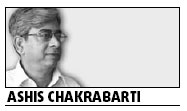Beware of the idols of the marketplace

Remember Vance Packard, the American journalist-turned-popular sociologist, whose books became something of a sensation in the 1960s and 1970s?
I have been remembering Packard a lot these days. And the reason is the global financial crisis.
Long before God got a new name - Market, Packard warned us against worshipping this false deity. With a clairvoyant's foresight, he saw the dangers that we will be in someday if we sacrifice everything at the altar of this false god.
His most famous book, The Hidden Persuaders, showed how advertising and the media, two of the market-god's many consorts, manipulated our lives and turned human beings into mere consumers. It told us how this manic culture of consumerism constantly forced you to want things that you did not actually want or need.
His other books, especially The Status Seekers, The Waste Makers and The Pyramid Climbers, all did more or less the same thing. Together, they created the image - and the predicament - of Man as Consumer with his insatiable quest for material things, his unending struggle to win the consumerist race and his impossible mission to stay at the top of the pyramid.
Well, these generalizations simply cannot capture the depth of Packard's vision or the power of his arguments. But the essence is this - there is something unreal and inherently destructive about this market mania and, more important, something sinister about the forces that manipulate it.
So you see why the global financial mess, triggered by the so-called subprime crisis, makes me recall Packard's warnings.
At this point, I can visualize some readers fidgeting and tossing back two basic questions at me.
Packard was not the only - or the first - writer to warn us against the perils of consumerism, these readers would like to tell me. Accepted. He certainly was not. There have been thinkers and writers in almost every culture who told us we should live within our means and who warned us against surrendering our lives to Mammon.
But I mention Packard because his warnings came at a time when Market, as we understand it today, was beginning to take hold of our lives. And his analysis of the media's - and advertising's - impact on our lives was a pioneering one.
The second poser is, however, much more tricky. What happens to the economy if people do not consume? Does not market - or consumption - drive the economy?
Yes, it does, as everyone knows. The issue is not the real economy or real consumption. The issue, as Packard argues in all his books, is about the unreal economy that tries to build itself on "waste", on surrealistic competition and on endless strivings for social climbing. In relation to the present financial crisis, the issue is whether life should be allowed to be an endless cycle of credit-driven consumption.
Obviously, consumption is necessary. But so are limits to consumption. In other words, there is a no life without market. But the important thing is to keep in mind that life is not a marketplace.
You will agree that this is no profound statement. But the point is Packard's "hidden persuaders" are trying everything - and all the time - to make you forget this basic truth. Even at the risk of oversimplifying, one can argue that the financial world turned upside down because the manipulators - and the people - forgot to remember this truth.
So the world, particularly the developing part of it, needs to increase consumption to make common people's lives better. These people need to spend - for the sake of the growth of a real economy. But they can do without the lures of the bubbles that an unreal financial system keeps floating.
By all means buy yourself or your child things that add real value to your or his/her life. Don't buy stuff just because the neighbor or his child has it. That's a spurious reason of the competition-manufacturing market.
In short, buy and consume goods - and services - but not wasteful goodies. Try that and see how happy, crisis-free life can be.
E-mail: ashis@chinadaily.com.cn
(China Daily 10/31/2008 page8)














